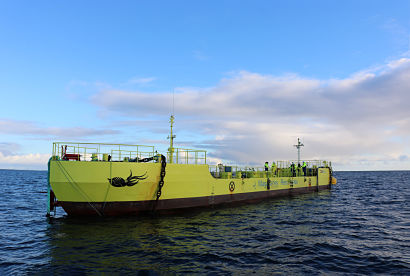
The development of EMEC – the world’s first and leading test centre for marine energy - has had a significant impact in Orkney as well as across the UK economy in terms of employment, supply chain development and encouraging public and private investment to service the sector.
An independent economic audit by BiGGAR Economics examined the value and benefit of EMEC’s activities from 2003-2023, exploring local and national impact.
The economic impact assessment found that the creation of EMEC, and subsequent activities that have burgeoned since, has amounted to £370 million gross value add (GVA) to the UK economy. £263 million of that was accrued in Scotland; and half of that, £130 million, in the Orkney Islands where EMEC is head quartered.
EMEC was set up as a not-for-profit test facility in 2003 following a recommendation by the House of Commons Science and Technology Committee to kick start a wave and tidal energy sector in the UK.
To date £42 million public funding has been invested in the centre by public sector organisations including Orkney Islands Council, Highlands and Islands Enterprise, and the Scottish and UK Governments. Thus over £8 has been accrued for every £1 spent by the public purse. The centre has been self-sufficient since 2011.
BiGGAR’s analysis considers the economic impact from EMEC’s operations across the full value chain, from construction of the site through to operation and demonstration activities. The analysis includes its direct impact through supply chain spend and salaries, as well as the multiplier effect of that spend catalysing activity throughout the sector.
EMEC has created highly skilled, high value jobs and is now one of the top 20 employers in Orkney. The number of people directly employed increased from 44 to 85 between 2017 and 2023, with average earnings higher than the Orkney average.
Additionally, BiGGAR estimate EMEC has instigated 224 jobs in Orkney over a twenty-year period; 406 across Scotland, and 540 in the UK as whole.
While EMEC was set up to develop a wave and tidal energy sector in the UK, the existence of the centre has instigated research and demonstrations around not only ocean energy, but also green hydrogen, storage solutions, smart local energy systems, transport and heat.
Since 2016, EMEC has diversified and grown its operations with support from competitively won grant-funded projects. EMEC has secured £49.5 million of research and development funding since 2016, the vast majority of which was inward investment to the UK.
EMEC is fundamental in supporting industry to commercialise new technology, reduce risk, reduce costs and improve efficiency by taking part in R&D projects totalling £538 million for the renewable industry.
“This report highlights marine energy’s potential to deliver high quality jobs and generate significant economic impact for Scotland” said Scottish Government Energy Minister Gillian Martin. “The Scottish Government has supported many of the marine energy projects at EMEC over the last two decades, as well as its pioneering activity in hydrogen and other energy technologies. As EMEC’s work demonstrates, Scotland is at the forefront of the clean energy transition and the centre has played an invaluable role in that over the last two decades. Marine energy can play a key part in delivering a just transition to net zero while creating further opportunities to export the technology, skills and knowledge around the world. The predictability and availability of marine energy off Scotland’s coastline, together with our early technological lead, provides a tremendous opportunity to make the most of our maritime heritage, secure a substantial share of the emerging global market and build on achievements to date.”
Neil Kermode, Managing Director at EMEC, thanked government foresight for the creation of the EMEC ocean energy test centre which has resulted in unrivalled activity in the marine energy sector around UK shores today.
“We’re seeing ship building being revitalised, with Dundee seeing the first vessel launch – in the form of Orbital’s O2 – since ship building stopped over forty years ago” said Mr Kermode. “We’re seeing the supply chain gear up with new equipment and we are seeing new jobs created daily. The development of a locally-grown renewables industry also strengthens the UK’s energy security and is triggering investment in peripheral areas supporting the levelling up agenda. In Orkney we’re seeing younger generations choosing to stay and work in Orkney as well as attracting people from around the world to work and study in the renewables sector. Our supply chain, much of which has diversified from other sectors into renewables, is sought after across the world. The work taking place around EMEC has instigated infrastructure upgrades locally, with knock on benefits to other sectors such as fisheries and tourism. EMEC’s a brilliant case study to demonstrate the value of developing marine renewables and pursuing a clean energy transition, a microcosm of what can be accrued on a far larger scale if we wholeheartedly push on developing industries that will help solve the climate crisis.”
For additional information:

